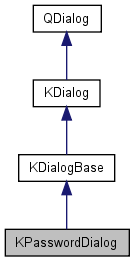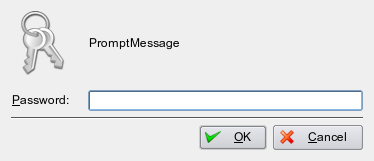kdeui
KPasswordDialog Class Reference
A password input dialog. More...
#include <kpassdlg.h>

Public Types | |
| enum | Types { Password, NewPassword } |
Public Member Functions | |
| void | addLine (QString key, QString value) |
| bool | allowEmptyPasswords () const |
| void | clearPassword () |
| bool | keep () const |
| KPasswordDialog (Types type, bool enableKeep, int extraBttn, const QString &iconName, QWidget *parent=0, const char *name=0) | |
| KPasswordDialog (int type, QString prompt, bool enableKeep=false, int extraBttn=0) KDE_DEPRECATED | |
| KPasswordDialog (Types type, bool enableKeep, int extraBttn, QWidget *parent=0, const char *name=0) | |
| int | maximumPasswordLength () const |
| int | minimumPasswordLength () const |
| const char * | password () const |
| int | passwordStrengthWarningLevel () const |
| QString | prompt () const |
| int | reasonablePasswordLength () const |
| void | setAllowEmptyPasswords (bool allowed) |
| void | setMaximumPasswordLength (int maxLength) |
| void | setMinimumPasswordLength (int minLength) |
| void | setPasswordStrengthWarningLevel (int warningLevel) |
| void | setPrompt (QString prompt) |
| void | setReasonablePasswordLength (int reasonableLength) |
| virtual | ~KPasswordDialog () |
Static Public Member Functions | |
| static void | disableCoreDumps () |
| static int | getNewPassword (QCString &password, QString prompt) |
| static int | getPassword (QCString &password, QString prompt, int *keep=0L) |
Protected Slots | |
| void | slotCancel () |
| void | slotKeep (bool) |
| void | slotOk () |
Protected Member Functions | |
| virtual bool | checkPassword (const char *) |
| virtual void | virtual_hook (int id, void *data) |
Detailed Description
A password input dialog.This dialog asks the user to enter a password. The functions you're probably interested in are the static methods, getPassword() and getNewPassword().
Usage example
QCString password; int result = KPasswordDialog::getPassword(password, i18n("Prompt message")); if (result == KPasswordDialog::Accepted) use(password);

KDE Password Dialog
Keeping passwords in memory can be a potential security hole. You should handle this situation with care.
- You may want to use disableCoreDump() to disable core dumps. Core dumps are dangerous because they are an image of the process memory, and thus include any passwords that were in memory.
- You should delete passwords as soon as they are not needed anymore. The functions getPassword() and getNewPassword() return the password as a QCString. I believe this is safer than a QString. A QString stores its characters internally as 16-bit wide values, so conversions are needed, both for creating the QString and by using it. The temporary memory used for these conversion is probably not erased. This could lead to stray passwords in memory, even if you think you erased all of them.
Definition at line 166 of file kpassdlg.h.
Member Enumeration Documentation
This enum distinguishes the two operation modes of this dialog:.
- Enumerator:
-
Password The user is asked to enter a password. NewPassword The user is asked to enter a password and to confirm it a second time. This is usually used when the user changes his password.
Definition at line 175 of file kpassdlg.h.
Constructor & Destructor Documentation
| KPasswordDialog::KPasswordDialog | ( | Types | type, | |
| bool | enableKeep, | |||
| int | extraBttn, | |||
| QWidget * | parent = 0, |
|||
| const char * | name = 0 | |||
| ) |
Constructs a password dialog.
- Parameters:
-
type,: if NewPassword is given here, the dialog contains two input fields, so that the user must confirm his password and possible typos are detected immediately. enableKeep,: if true, a check box is shown in the dialog which allows the user to keep his password input for later. extraBttn,: allows to show additional buttons, KDialogBase. parent Passed to lower level constructor. name Passed to lower level constructor
- Since:
- 3.0
Definition at line 303 of file kpassdlg.cpp.
| KPasswordDialog::KPasswordDialog | ( | int | type, | |
| QString | prompt, | |||
| bool | enableKeep = false, |
|||
| int | extraBttn = 0 | |||
| ) |
- Deprecated:
- Variant of the previous constructor without the possibility to specify a parent. Will be removed in KDE 4.0
Definition at line 324 of file kpassdlg.cpp.
| KPasswordDialog::KPasswordDialog | ( | Types | type, | |
| bool | enableKeep, | |||
| int | extraBttn, | |||
| const QString & | iconName, | |||
| QWidget * | parent = 0, |
|||
| const char * | name = 0 | |||
| ) |
Construct a password dialog.
Essentially the same as above but allows the icon in the password dialog to be set via iconName.
- Parameters:
-
type if NewPassword is given here, the dialog contains two input fields, so that the user must confirm his password and possible typos are detected immediately enableKeep,: if true, a check box is shown in the dialog which allows the user to keep his password input for later. extraBttn,: allows to show additional buttons. iconName the name of the icon to be shown in the dialog. If empty, a default icon is used parent Passed to lower level constructor. name Passed to lower level constructor
- Since:
- 3.3
Definition at line 312 of file kpassdlg.cpp.
| KPasswordDialog::~KPasswordDialog | ( | ) | [virtual] |
Member Function Documentation
| bool KPasswordDialog::allowEmptyPasswords | ( | ) | const |
| virtual bool KPasswordDialog::checkPassword | ( | const char * | ) | [inline, protected, virtual] |
Virtual function that can be overridden to provide password checking in derived classes.
It should return true if the password is valid, false otherwise.
Definition at line 391 of file kpassdlg.h.
| void KPasswordDialog::clearPassword | ( | ) |
Clears the password input field.
You might want to use this after the user failed to enter the correct password.
- Since:
- 3.3
Definition at line 463 of file kpassdlg.cpp.
| void KPasswordDialog::disableCoreDumps | ( | ) | [static] |
Pops up the dialog, asks the user for a password and returns it.
The user has to enter the password twice to make sure it was entered correctly.
- Parameters:
-
password The password is returned in this reference parameter. prompt A prompt for the password. This can be a few lines of information. The text is word broken to fit nicely in the dialog.
- Returns:
- Result code: Accepted or Rejected.
Definition at line 572 of file kpassdlg.cpp.
Pops up the dialog, asks the user for a password, and returns it.
- Parameters:
-
password The password is returned in this reference parameter. prompt A prompt for the password. This can be a few lines of information. The text is word broken to fit nicely in the dialog. keep Enable/disable a checkbox controlling password keeping. If you pass a null pointer, or a pointer to the value 0, the checkbox is not shown. If you pass a pointer to a nonzero value, the checkbox is shown and the result is stored in *keep.
- Returns:
- Result code: Accepted or Rejected.
Definition at line 555 of file kpassdlg.cpp.
| bool KPasswordDialog::keep | ( | ) | const [inline] |
| int KPasswordDialog::maximumPasswordLength | ( | ) | const |
| int KPasswordDialog::minimumPasswordLength | ( | ) | const |
| const char* KPasswordDialog::password | ( | ) | const [inline] |
Returns the password entered.
The memory is freed in the destructor, so you should make a copy.
Definition at line 334 of file kpassdlg.h.
| int KPasswordDialog::passwordStrengthWarningLevel | ( | ) | const |
Password strength level below which a warning is given.
- Since:
- 3.4
Definition at line 717 of file kpassdlg.cpp.
| QString KPasswordDialog::prompt | ( | ) | const |
| int KPasswordDialog::reasonablePasswordLength | ( | ) | const |
Password length that is expected to be reasonably safe.
- Since:
- 3.4
Definition at line 706 of file kpassdlg.cpp.
| void KPasswordDialog::setAllowEmptyPasswords | ( | bool | allowed | ) |
| void KPasswordDialog::setMaximumPasswordLength | ( | int | maxLength | ) |
Maximum acceptable password length.
Limited to 199. Default: No limit, i.e. -1
- Parameters:
-
maxLength,: The new maximum password length.
- Since:
- 3.4
Definition at line 679 of file kpassdlg.cpp.
| void KPasswordDialog::setMinimumPasswordLength | ( | int | minLength | ) |
Minimum acceptable password length.
Default: If empty passwords are forbidden, 1; Otherwise, 0.
- Parameters:
-
minLength,: The new minimum password length
- Since:
- 3.4
Definition at line 670 of file kpassdlg.cpp.
| void KPasswordDialog::setPasswordStrengthWarningLevel | ( | int | warningLevel | ) |
Set the password strength level below which a warning is given Value is in the range 0 to 99.
Empty passwords score 0; non-empty passwords score up to 100, depending on their length and whether they contain numbers, mixed case letters and punctuation.
Default: 1 - warn if the password has no discernable strength whatsoever
- Parameters:
-
warningLevel,: The level below which a warning should be given.
- Since:
- 3.4
Definition at line 711 of file kpassdlg.cpp.
| void KPasswordDialog::setPrompt | ( | QString | prompt | ) |
| void KPasswordDialog::setReasonablePasswordLength | ( | int | reasonableLength | ) |
Password length that is expected to be reasonably safe.
Default: 8 - the standard UNIX password length
- Parameters:
-
reasonableLength,: The new reasonable password length.
- Since:
- 3.4
Definition at line 697 of file kpassdlg.cpp.
| void KPasswordDialog::slotCancel | ( | void | ) | [protected, virtual, slot] |
Activated when the Cancel button has been clicked.
The QDialog::reject() is activated in regular mode and QDialog::done( Cancel ) when in message box mode.
Reimplemented from KDialogBase.
Definition at line 542 of file kpassdlg.cpp.
| void KPasswordDialog::slotKeep | ( | bool | keep | ) | [protected, slot] |
Definition at line 548 of file kpassdlg.cpp.
| void KPasswordDialog::slotOk | ( | void | ) | [protected, virtual, slot] |
Activated when the Ok button has been clicked.
The QDialog::accept() is activated.
Reimplemented from KDialogBase.
Definition at line 511 of file kpassdlg.cpp.
| void KPasswordDialog::virtual_hook | ( | int | id, | |
| void * | data | |||
| ) | [protected, virtual] |
The documentation for this class was generated from the following files:
 KDE 3.5 API Reference
KDE 3.5 API Reference